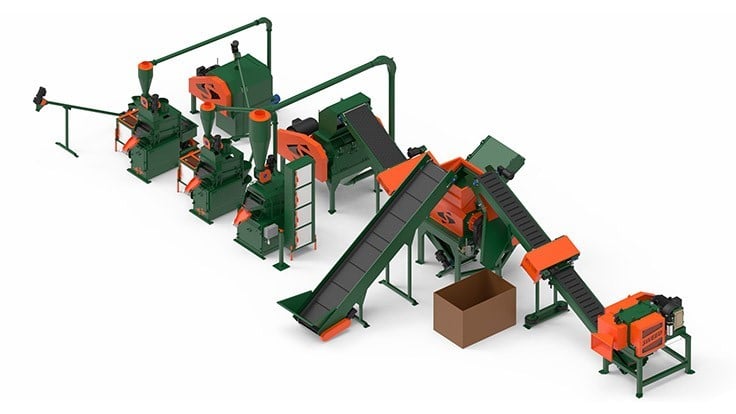Sweed system worthy of an Encore
Written by: Josh Francis of Eugene, Oregon-based Revolution Design Group
As Seen In Recycling Today Magazine

McKinney, Texas-based aluminum and copper wire producer Encore Wire Corp. is now using four wire and cable chopping machines supplied by Gold Hill, Oregon-based Sweed Machinery Inc.
Encore Wire has what it describes as “enormous production capacity” to make wire that is distributed widely throughout the United States. But the company’s process engineer Scott Thompson says its scrap processing capabilities lagged behind in sophistication. “We used to have a very labor intensive scrapping process,” Thompson says. “It was a huge labor cost and could potentially pose a hazard to employees.”
At first, the company updated its scrap processing system with a machine from a different equipment manufacturer. “It was a poorly designed and outdated machine,” Thompson says. “The only part of it that worked effectively was a small chopper by Sweed, and it worked really well.”
After considering that, Thompson called Sweed, who he says worked closely with him to understand Encore’s needs, capacity and goals. Four years later, Encore now has three additional Sweed machines customized to its needs, and its scrap processing system has never been more streamlined, according to Thompson.
“Sweed’s machines have exceeded expectations,” he says. Encore uses Sweed’s Model 5703 XHD scrap chopper and PCR 1034 pre-chopper to process linear scrap material. Encore can thus efficiently liberate the copper and aluminum from the products fed into the machines, says Thompson.
Shaker tables further process the PVC, XLPE and nylon plastic coatings by isolating them from the nonferrous copper and aluminum materials to be reclaimed. “We produce and ship millions of pounds of finished product every year,” states Thompson. “A result of manufacturing that much volume is we generate PVC, XLPE and aluminum scrap every year, which diminishes our bottom line.”
Sweed’s machines are enabling Encore to efficiently reclaim reusable raw materials at a lower cost, all while increasing quality and volume of its renewable raw materials internally, according to the company. This increase in material use efficiency and labor savings has resulted in Encore increasing its bottom line.
Throughout this process, working with Sweed has been seamless, according to Thompson. “We’re in regular contact for preventive maintenance, and I can call or text any time and get an answer right away,” he comments. “These days, it’s hard to find a company like that.”
Because Sweed’s equipment is built in the U.S., orders and parts arrive quickly. “The locality and flexibility are great,” says Thompson. “You don’t have to wait weeks for parts shipped from England or Germany.” Recently, when Encore needed a custom auger, Sweed was able to build it to Encore’s specifications and ship it to them quickly without any workflow interruption, he says.
“It’s a great company,” states Thompson, adding that Sweed provides “old school manufacturing that’s down-to-earth and easy to deal with. They’ve got a good way of doing business – just like us.”

